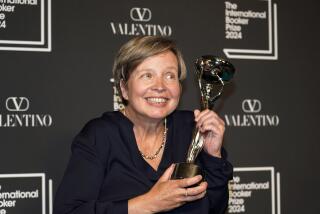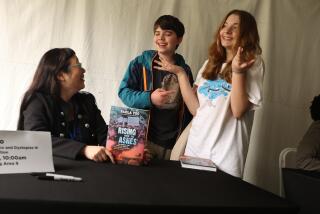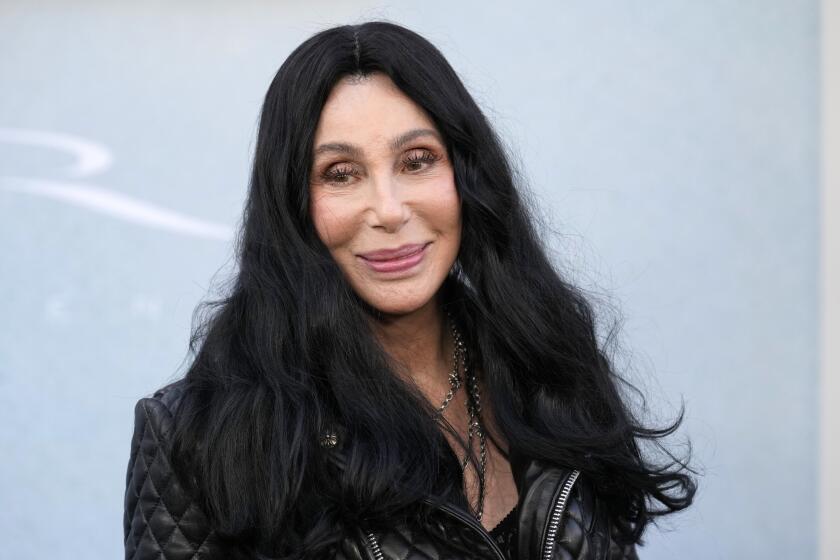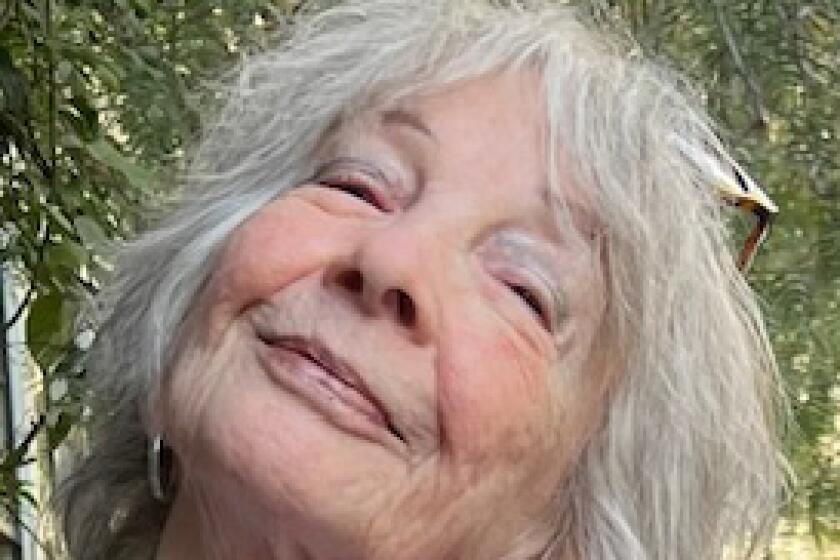Q&A: Coming to the Festival of Books: Jill Alexander Essbaum and ‘Hausfrau’
In her poetry and in her debut novel, “Hausfrau,” Jill Alexander Essbaum rides an edge of sexual tension. The story of an American wife in Switzerland who begins making some questionable decisions, the book, out March 17, has been compared to both “Madame Bovary” and “Fifty Shades of Grey.”
Although the novel is set in the present, its protagonist, Anna Benz, inhabits a kind of 19th century of the soul. Barely conversant in German, she is marooned in a small town with her distant (albeit hunky) Swiss husband, disapproving mother-in-law and three young children. Anna seeks relief from her isolation in a series of extramarital affairs, which rapidly escalate beyond her control.
Essbaum will appear at the Festival of Books on April 19 on the 12:30 p.m. panel “Fiction: Stories We Tell Ourselves” with Karl Taro Greenfeld, Matthew Specktor and Antoine Wilson. She has published several poetry collections and teaches in the UC Riverside Low Residency MFA program. She spoke by telephone from her home in Austin, Texas.
FULL COVERAGE: FESTIVAL OF BOOKS
Is “Hausfrau” your first foray into fiction, or have you always written fiction along with poetry?
I wrote the requisite bad-girl high school fiction, along with the requisite sad-girl high school poetry. When I was in college I wanted to write novels. But I found I really liked the challenge of poetry, of trying to say things in a certain shape. And actually this novel is very formal in its shape: There are three sections, each about the same length, each with a birthday party in it. They kind of rhyme with each other, like stanzas. I didn’t do that to make a statement. It’s an organizing principle. It’s like having the people from Crate and Barrel come to your house and organize your closet.
Did you encounter any challenges in writing a novel that your experience with poetry made harder? Or easier?
In poetry I don’t have to worry about plot, setting or characters. I let one word inform the next. I always warn my students against coming at their writing already knowing what they want to say. That’s like the Lego kits that have the picture on the front of what you’re building, rather than the ones when I was a kid that were just a bunch of different Legos.
That philosophy really helped me in writing the book. I wrote it word by word. When I didn’t know what would happen next, I just chased the next word. I’ve heard early feedback, and people are saying they don’t like Anna as a character, but that they feel a lot of sympathy for her, and I would like to think it’s because I was able to follow her step by step. Maybe poetry trained me in control. Poets don’t have as much space to work in, typically, so we learn to do more with fewer words.
Have you been surprised by readers’ animosity toward Anna?
It never occurred to me that people wouldn’t like her. I’ve lived with her as a character for a very long time. From the minute I started writing her, I was obsessed with her. As I wrote toward her ending, she would show up in my prayers, because she felt so present. Of course I see why people don’t like her. Her choices are terrible. That said, there isn’t a single person among us who hasn’t done something that we really wish we hadn’t, or something that we can’t undo. We’re all only a couple of clicks away from making a decision that would really change our lives. We’re always very close -- closer than we think.
Does it concern you at all that, because you lived in Switzerland, people may see the novel as a thinly veiled autobiography?
I did live in Switzerland, and there are a few things that Anna and I have in common. When I was there, it was difficult for me to speak German. I went there with the man I was married to at the time, who was a student. He had a purpose to be there, and a community, and it was a really good experience for him. His German was much better than mine. My purpose was not as defined. My community of writers was back in the States. And without the language that I had loved so much since I was a kid ... I mean, words are my business. I tried so hard, and I took German classes, but it was just a very alienating experience. I did some of the things that Anna does. I rode the trains. I went to the grocery store. I sat on the bench a lot in the woods. But that’s where our stories diverge.
“Hausfrau” is an expatriate’s story. Anna’s isolation is so much a part of her identity. Do you think Switzerland has anything to do with her unraveling?
Let me turn that around a little bit. People have asked me whether I was trying to make a statement about 21st century women, and what it means to be a wife, and whether or not I meant to have this hand of God reaching down making a huge judgment. And I have suggested that — while I firmly believe that once the book has left the author’s hand, he or she has no business telling people what to think about it — that’s not probably the way to look at this book. This book is not about all womens’ experience; it’s about this particular woman’s experience. My defense of that is that it’s so interior. It’s so specific to her situation, which does happen to be Switzerland, which is an insular country, and this town, which is small, and then also, her marriage, which is suffocating, and also the four walls of her house, and then even the skin of her body.
Your poetry also deals with the erotic. Do you think it takes a particular kind of courage for a woman in our culture to write about sex?
I don’t know about courage. It’s not coal mining. But I know what you’re saying: It’s weird territory. It’s not dainty. It’s not ladylike. Here’s how I approach writing: If you don’t push the envelope to the edge of the table, then why are you moving around the envelope at all? But you can push it off the table, and then it’s too far. So there’s that lip, that edge, that interests me. Some readers have suggested that the sex scenes are gratuitous, but some have said that they’re entirely germane to Anna’s character. I agree. They taught me different things about her. I think some things are probably better left unsaid, but in a book like this, you have to say them.
How do you feel about comparisons between your book and “Fifty Shades”?
I’m OK with it! Clearly it’s the sex that people are connecting. There’s a lot less rope in my book. But there are lots of ways that a woman can be in bondage, and not all of them are unpleasant for her. And also, I don’t begrudge a book its success. Wasn’t “Madame Bovary” looked at as scandalous at the time?
Were you consciously echoing Flaubert’s “Madame Bovary” in “Hausfrau”? What about Tolstoy’s “Anna Karenina”?
There’s a huge nod toward Tolstoy, but the book is mostly an homage to “Madame Bovary.” Flaubert is very important in my life. There’s another book that I haven’t brought into the conversation much: “The Awakening” by Kate Chopin. But “Hausfrau” is not a retelling of any of these. I wanted to take the scenario: This woman who’s out of her element, she’s with a man who’s not terrible, and she’s trying to make a go of it, but at some point she’s, like, OK, this isn’t working.
I love the first line of the book, “Anna was a good wife, mostly.” Do you remember where you were when you thought of that?
I wish I did. But, you know, for the longest time, that was not the first chapter. There was a chapter in front of it, and I could never get it to work. Finally I was on a walk one day and I thought, “Duh. That’s because it’s not the first chapter.” And after a year of trying to make it sound right, I cut it. So here’s your literary lesson, kids: Let go of what you think you have to have. I tell my students all the time, “Your poem is great. Now cut the first three stanzas and the last stanza.” It’s hard to realize that we don’t need our training wheels.
Jill Alexander Essbaum will appear at the Festival of Books on April 19.
More to Read
Sign up for our Book Club newsletter
Get the latest news, events and more from the Los Angeles Times Book Club, and help us get L.A. reading and talking.
You may occasionally receive promotional content from the Los Angeles Times.






